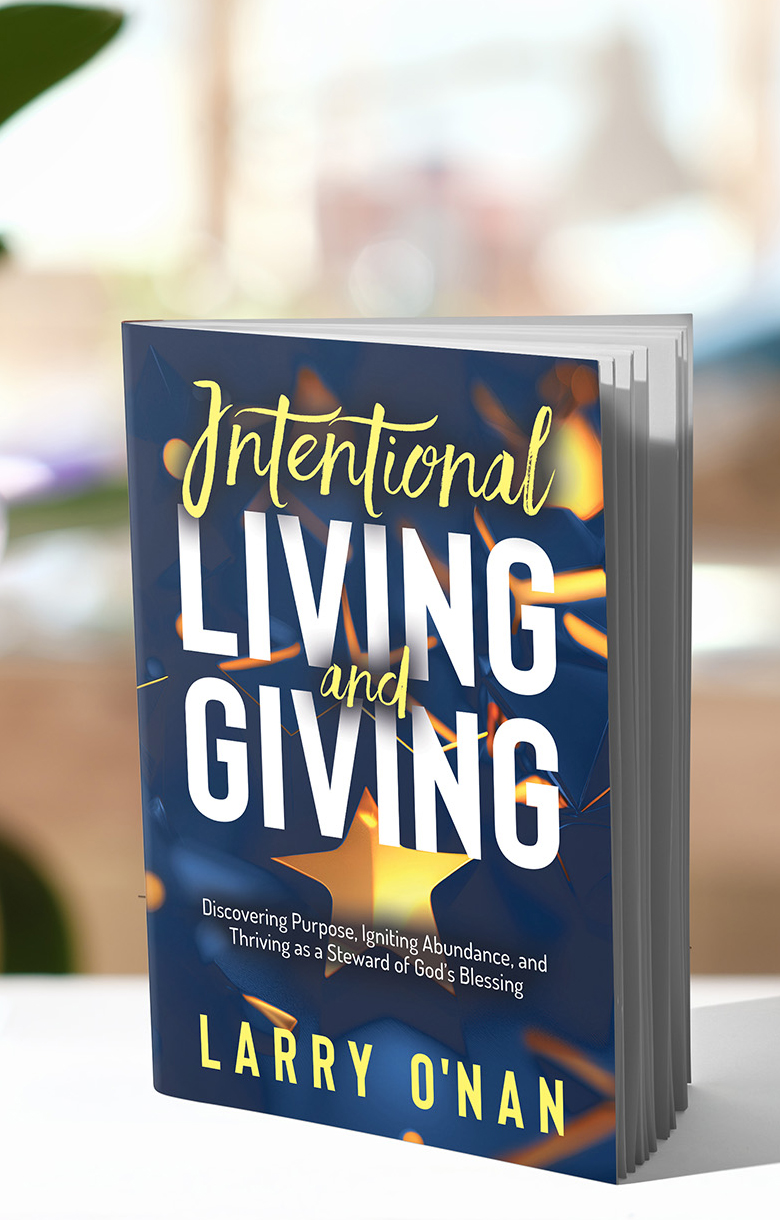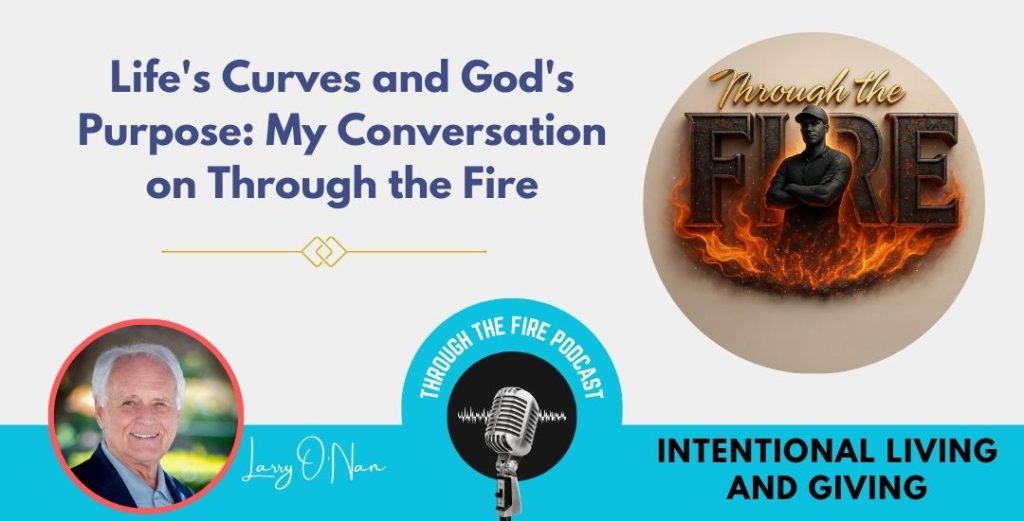Recently had a great time chatting with Ryan Wickline on his podcast “Through the Fire.” We covered a lot of ground in our conversation; from my theater days back in college to losing my wife to a brain tumor, and ultimately discovering what it means to truly thrive rather than just survive. Ryan’s show is all about getting through the fire, and boy, did we have some stories to share about exactly that.
Life Isn’t a Straight Line (It’s Full of Curves)
You know, I told Ryan something that I’ve learned over my 82 years: life is not a straight line toward greatness. It’s full of curves, and those curves are what cause us to grow the most.
I used to think I had it all figured out. Back in my college days, I was convinced I was heading straight to Hollywood or Broadway. Theater was my world, and I thought that was a straight shot to success. But life had other plans.
Think about it this way; if I live here in Southern California and want to drive to Dallas, I’ve got to head east on Interstate 10 or 40. If I want to go to Seattle, I’m going north on Interstate 5. I can’t get to Dallas by going north, I’ll end up in Seattle because that’s the direction I chose. But here’s the thing: most people don’t know where they’re going, so they become like bumper cars at a carnival, just getting jarred around by whatever comes at them next.
Just last week in Hawaii with my grandkids, I was driving one of those curvy mountain roads. There was one spot where I had to slow down to 15 miles per hour to make this hairpin turn. The whole road was 25 to 45 mph, but that one curve required me to really slow down and pay attention. I was glad I obeyed that sign because when I came out of that curve, I realized it was a real hairpin that could have been dangerous if I’d tried to take it too fast.
That’s life right there. The curves are going to come whether we like it or not. We might as well learn to navigate them properly.
From Performance to Personal Faith
Growing up as a preacher’s kid in the 1940s was all about performance. Everything was measured by how you looked, how you acted, the length of your hair, even the length of your shirt cuffs. The better you looked, the more religious everyone thought you were. But I never could see that in what they were preaching from the Bible. But I could clearly see it in what they were delivering to the people though.
It wasn’t until I was a junior at the University of Colorado that everything changed. I was in this theater class one day and realized that all 15 or 20 students were learning to act 24/7. We weren’t being our real selves anymore, we were taking on personalities all the time. I started thinking, “This is not for real. There’s something wrong here.”
That’s when I met three engineering students who really had a personal relationship with God. I couldn’t believe engineers could even think that way, and they couldn’t believe they actually liked a theater arts major! But those guys showed me a completely different way to see what faith could be. It wasn’t about performance, it was about relationship.
When Life Throws You a Curveball
I’ve probably been fired or had my job responsibilities abruptly changed four or five times in my career, and I never once volunteered for it. But you know what? Those experiences were preparing me for what I was really supposed to do.
The biggest curve came about a decade ago when my wife died from a glioblastoma brain tumor – the same kind that took Bo Biden and Ted Kennedy. When they tell you someone has a GBM, you know it’s terminal. The doctors can do surgery and remove a lot of it, but they can’t get all of it because it’s like a jellyfish with tentacles that go down into the folds of the brain.
After 45 years of marriage, that’s a radical change. But I had a choice to make. I could see it as something I’d lost completely, or I could see it as a change of address for her. I chose the latter. I had friends telling me they’d be there when I collapsed, when I became a basket case. But I never hit that because I chose not to go that route.
Instead, I said, “Okay, this was a good season of life. It was a surprise, and I don’t want to wish it on anybody, but I’m here and she’s gone. Now I choose to make a new list of my wills and commitments.”
The Power of Writing It Down

Here’s something I’ve learned: it doesn’t exist until you write it down. Your brain can give you all kinds of dreams and concepts, but if it’s not in writing, it doesn’t exist. Right now I’ve got 10 commitments and 12 “I wills” that I periodically review because I need to remind myself of what I’m committed to and what I choose to do versus what I don’t choose to do.
Every morning when I’m stretching my ankles before getting out of bed (you need to do that more at 80 than you did at 40!), I think, “Okay, Lord, what in the world do you have in store for me today? What’s on the to-do list, and how can I help somebody else thrive while I’m learning to thrive today?”
That’s the difference between intentional living and just bumper-car living. The word “intentional” is fundamental in my book title because intentionality means saying “that is what I’m going to do” and then actually doing it.
From Fundraising to Fund Development
My consulting career really started with 28 boxes of pledge cards sitting in a bathtub. This organization had this huge event with 80,000 teenagers, and afterward, someone brought me to a converted bathroom office and pulled back the shower curtain. There were these boxes stacked to the ceiling; $2 million worth of pledges that had been sitting there for three months because nobody knew what to do with them.
That introduced me to the world of fund development, but I learned there’s a huge difference between fundraising and fund development. Fundraising is always an exchange; you give me this, I’ll give you that t-shirt or plaque or whatever. But fund development is about relationships and helping people understand biblical stewardship.
See, stewardship is more than about money, it’s about management. It’s leadership management on behalf of the One who owns it all. I don’t really own my house in California, even though the state makes me pay taxes on it. I don’t own my Lexus with 300,000 miles, even though I’m proud of how well it’s running. I’ve been entrusted to manage these things, but they’re not really mine.
I worked with a businessman from North Carolina who came to one of my seminars all excited about doing “full-time ministry” after selling his business. But after five hours of going through these principles, he realized God had wired him to be good at making money. So instead of doing what he thought would be fun, he started a second business and gave away 95% of the proceeds. He made millions more over the next five years, then retired a second time to do the ministry work he’d originally wanted to do.
The amount doesn’t matter. Jesus talked about the widow who gave two cents, all she had, and said she’d given more than anyone else because they were giving from their abundance, but she was giving everything.
Living with Intentional Purpose
Most people struggle with finding purpose because they don’t have a relationship with God in the first place. We can be religious in our culture, going through routines, showing up at certain times, doing all the to-dos, but that’s just performance. That’s trying to show God you’re somehow worthy.
Real purpose comes from connecting with your Creator and then becoming schooled in what that lifestyle looks like. Once you intentionally decide where you’re going, you pack accordingly. If I’m going back to Hawaii, I’m packing shorts and hiking gear. If I’m going to Dallas for business meetings, I’m packing dress shirts and my computer. You’ve got to know your destination to pack properly.
When I decided to follow the leader of my creation, I started seeing things differently. Even adversity became a teacher. I tell people all the time: adversity is there to help you. Accept it. Tell yourself, “This is part of the curve that’s going to help me become a better person.” Because around that curve is another curve, and there’s a future out there.
Don’t be satisfied living in complacency and depression. Look at life as an experience and journey given to you by a great God.
Why Not Thrive?
You know what I told Ryan at the end of our conversation? Many people think, “Okay, I’m going to survive today.” But I think, why survive when you really CAN thrive?
If you want to hear more about these principles and the stories behind them, I’d encourage you to listen to the full podcast conversation with Ryan on “Through the Fire.” We covered even more ground than I’ve shared here.
And if this resonates with you, check out my book “Intentional Living and Giving” – it’s that yellow and blue cover that looks like Juicy Fruit gum! You can find it on Amazon, Barnes & Noble, or wherever you get your books. There’s also more resources and my blog posts at laryonan.com (just remember, no apostrophe in the website because computers don’t like that character).
The bottom line is this: you’re not here by mistake. You’re here with an intentional purpose. Life doesn’t have to be about getting jarred around like a bumper car. There’s a clear path to thriving, but it’s a decision somebody’s got to make.
What curves is life throwing at you right now? Maybe it’s time to slow down, navigate them properly, and see where they’re actually leading you.


